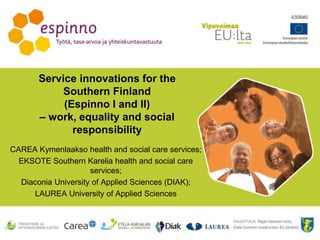
Service innovations Southern Finland health social care
- 1. Service innovations for the Southern Finland (Espinno I and II) – work, equality and social responsibility CAREA Kymenlaakso health and social care services; EKSOTE Southern Karelia health and social care services; Diaconia University of Applied Sciences (DIAK); LAUREA University of Applied Sciences
- 2. Service innovations for the Southern Finland • Citizen’s municipality of domicile is responsible for arranging public social and health services in Finland • Demand for institutional and home care services continues to rise due to an increasing need for more versatile service provision for the elderly, people with disabilities, and families with children. 8.1.2015 Riitta-Maija Hämäläinen Espinno 2
- 3. The objectives of the ESPINNO project are to – find and analyze service innovations, – develop service products, and – improve the image and competitiveness of social enterprises in creating employment opportunities and providing human resources to meet the increasing service needs through social criteria in public procurement 8.1.2015 Riitta-Maija Hämäläinen Espinno 3
- 4. SOCIAL ENTERPRISES AND SERVICE INNOVATIONS • The aim is to provide services and human resources for auxiliary tasks and support services in the health and social care field • Municipalities facilitate service innovations and (social) enterprises by using social criteria in their procurements which have helped to boost the number of (social) enterprises • Results: – handbook on using social criteria in procurement – handbook on how to produce employment process descriptions and task profiles of support services and auxiliary tasks and how to put these to use in the welfare services – Available in Finnish at www.espinno.fi 8.1.2015 Public procurement for local employment/email: riitta-maija.hamalainen@thl.fi 4
- 5. Management and decision making in the municipalities • Council is the highest decision-making power (elected) • In case of various municipalities together the municipal councils of the participating municipalities appoint members to the Council for the duration of their term in the office based on the population of the municipality in case on. • The council’s tasks include appointing the administrative board, audit committee, and managing directors and approving the rules of procedure, financial statement, budget, and financial plan. • The administrative board manages operations. • The Managing Director is responsible for operative management; supported by a committee of municipality managers, particularly in relation to planning of the financial operational conditions of the joint authority. 8.1.2015 5Riitta-Maija Hämäläinen Espinno
- 6. PUBLIC SECTOR AS RESPONSIBLE BUYER Why bother? 8.1.2015 Public procurement for local employment/ email: riitta-maija.hamalainen@thl.fi 6
- 7. REQUIRING CONTRACTORS TO DELIVER SOCIAL REQUIREMENTS MEANS – Municipalities can get more both directly and indirectly for tax payers money – Creating skills and training opportunities (e.g. apprenticeships or on-the-job-training) – Creating employment opportunities for the long-term unemployed – Encouraging equal opportunities for all, regardless of gender, race and disability – Supporting SMEs and social enterprises 8.1.2015 Public procurement for local employment/ email: riitta-maija.hamalainen@thl.fi 7
- 8. BENEFITS OF SOCIAL PROCUREMENT • Promoting fair and ethical trade – think globally – act locally • Driving innovation in design or build • Protecting the environment • Community ownership of public assets – social and sustainable procurement into public sector practices: social sustainability for economically disadvantaged areas. 8.1.2015 Public procurement for local employment/ email: riitta-maija.hamalainen@thl.fi 8
Notas del editor
- Why bother? Citizen’s municipality of domicile is responsible for arranging public social and health services in Finland – employment as source of wellbeing, health -> decrease the costs of ill-health Demand for institutional and home care services continues to rise due to an increasing need for more versatile service provision for the elderly, people with disabilities, and families with children. Because in most cases you can integrate social benefits into every stage of the procurement process – provide apprenticeships or other opportunities for the long-term unemployed. Financial issues and municipalities Millainen sosiaalisten näkökulmien hyödyntäjä halutaan olla? •Julkisten hankintojen lainsäädäntö antaa puitteet, mutta organisaation omat linjaukset ja päätökset tärkeimpiä •Tavoitellaanko esimerkiksi työllisyyden parantamista, palvelujen esteettömyyttä, reilua kauppaa, alihankintamahdollisuuksien lisäämistä, harmaantalouden torjuntaa? •Mitä hyötyä sosiaalisten näkökulmien hyödyntämisestä on esimerkiksi: •yksittäiselle työntekijälle, palveluja järjestävälle ja rahoittavalle kunnalle sekä palvelun tuottajalle? •uusien tuotteiden ja palveluiden synnyttämisessä? •Sosiaaliset ja taloudelliset näkökulmat voivat vahvistaa toisiaan
- The aim of the project is to both identify good practices for the development of employment services, particularly in municipalities, and to facilitate the implementation of those practices in Finland. Good practices advance the life management skills and employment prospects of young people, immigrants and persons with partial working abilities. The project focuses on developing municipal employment services and looking for ways to increase customer-oriented collaboration between the government administrated Employment and Economic Development Offices, municipalities, educational institutions, and organizations or businesses that provide rehabilitation and employment services. As a result of the project, a comparative report on the inclusive employment policies of different countries will be prepared. It will be used as the basis for recommendations for the development of inclusive employment policies, and to improve the employment prospects of people in disadvantaged positions. The principles and application of employment policy will be made more customer-oriented and effective.